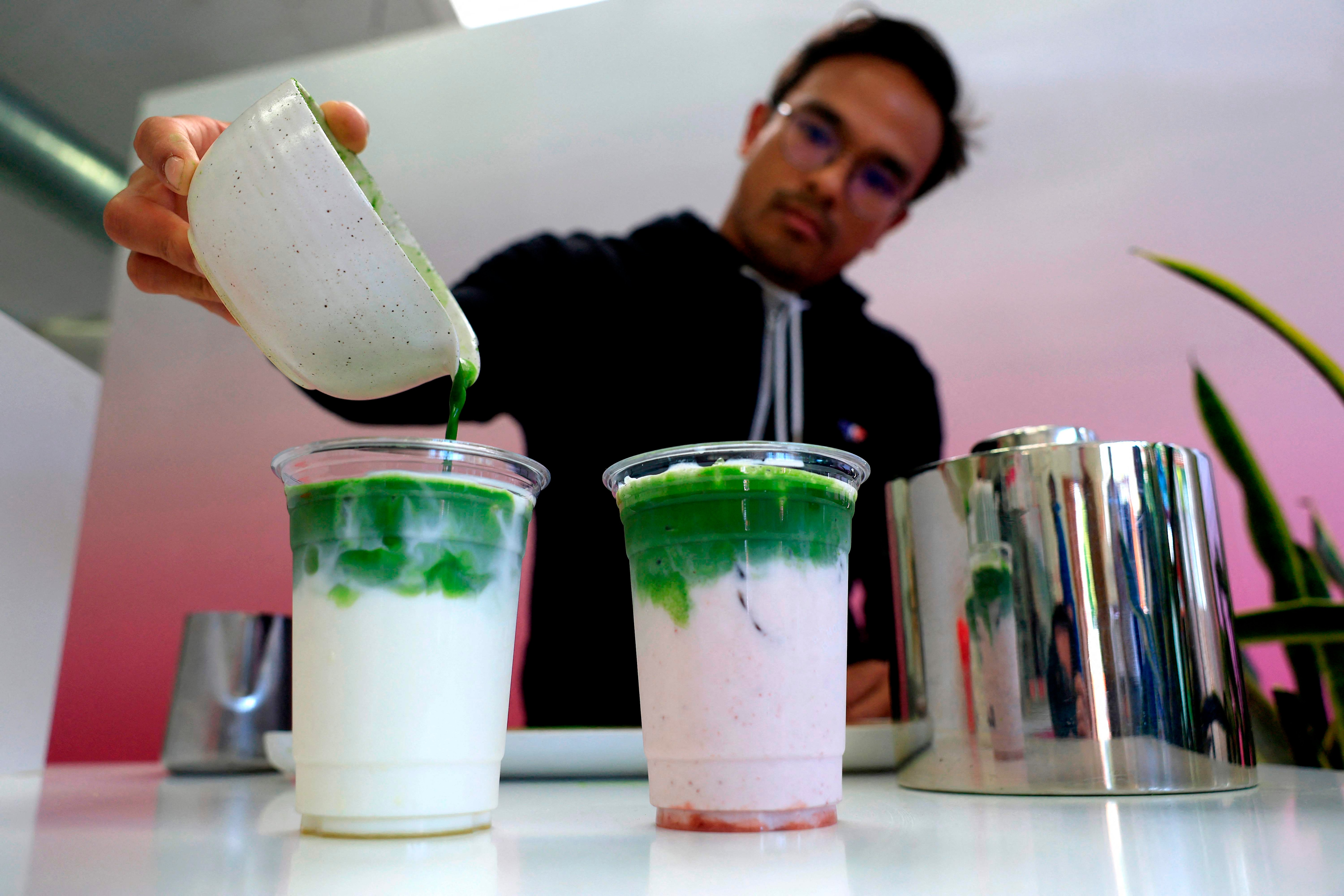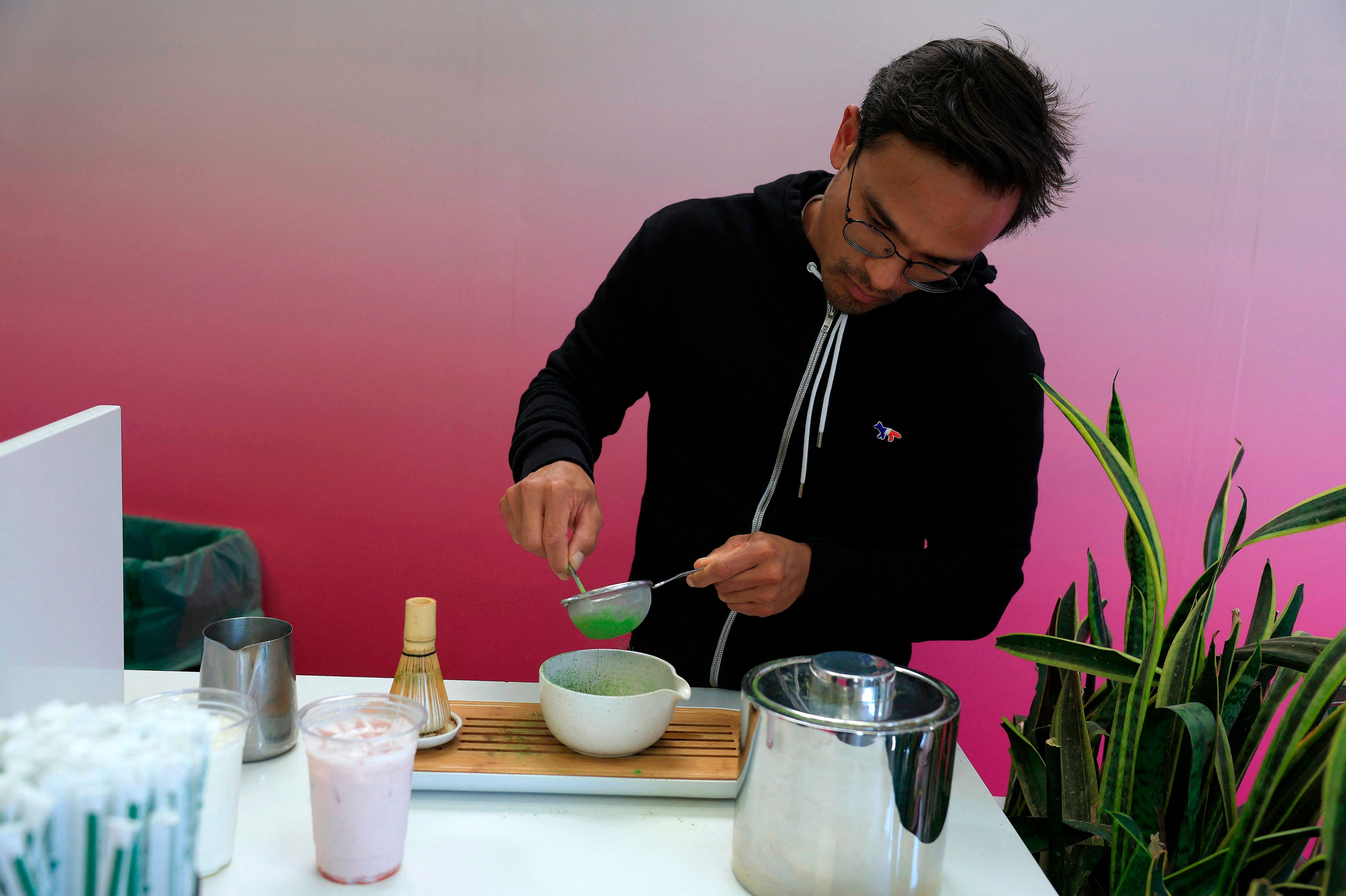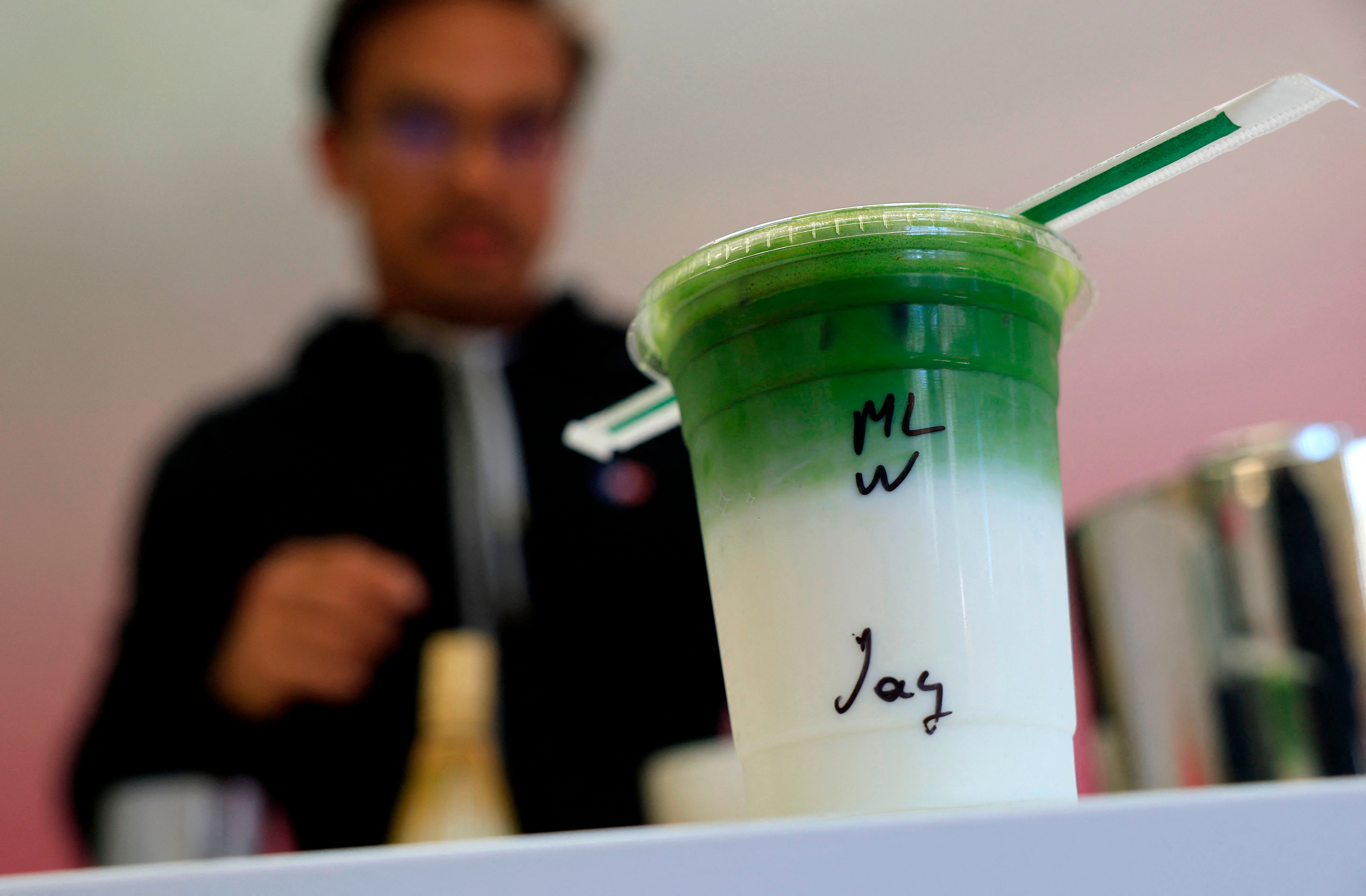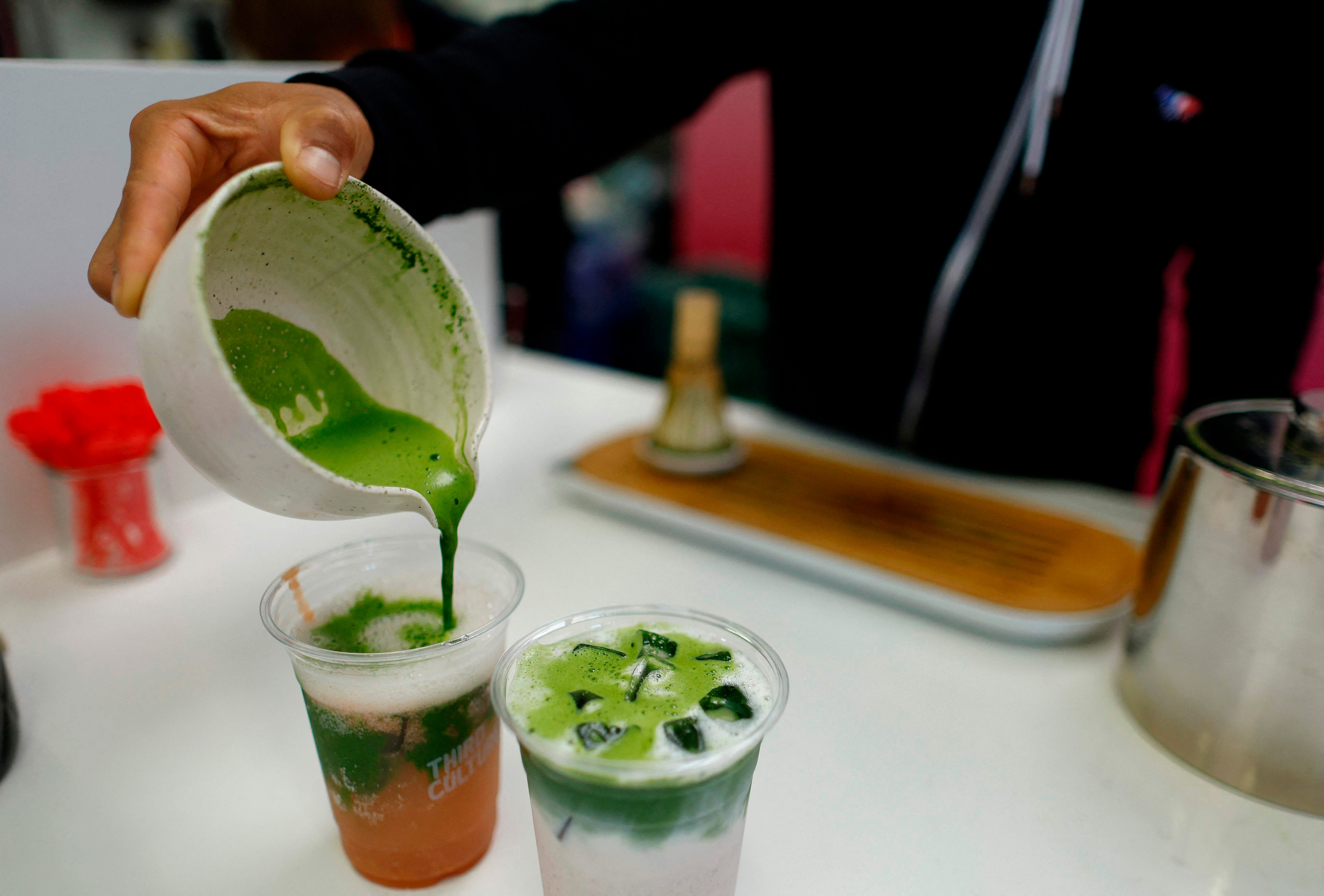Standardartikel m. billedserie med dedikeret teaserelement

BERKELEY, CALIFORNIA - JULY 15: Sam Butarbutar makes a matcha drink at Third Culture on July 15, 2025 in Berkeley, California. A recent surge in matchas popularity has led to a global matcha shortage, driven by soaring demand and limited production in Japan, where high-quality matcha is grown. The labor-intensive harvesting and processing methods of matcha, along with a decline in the number of Japanese tea farmers, have further exacerbated the shortage. Justin Sullivan/Getty Images/AFP (Photo by JUSTIN SULLIVAN / GETTY IMAGES NORTH AMERICA / Getty Images via AFP) (Foto: © Justin Sullivan, AFP/Ritzau Scanpix) 
BERKELEY, CALIFORNIA - JULY 15: Sam Butarbutar makes a matcha drink at Third Culture on July 15, 2025 in Berkeley, California. A recent surge in matchas popularity has led to a global matcha shortage, driven by soaring demand and limited production in Japan, where high-quality matcha is grown. The labor-intensive harvesting and processing methods of matcha, along with a decline in the number of Japanese tea farmers, have further exacerbated the shortage. Justin Sullivan/Getty Images/AFP (Photo by JUSTIN SULLIVAN / GETTY IMAGES NORTH AMERICA / Getty Images via AFP) (Foto: © Justin Sullivan, AFP/Ritzau Scanpix) 
BERKELEY, CALIFORNIA - JULY 15: A freshly made matcha drink sits on the counter at Third Culture on July 15, 2025 in Berkeley, California. A recent surge in matchas popularity has led to a global matcha shortage, driven by soaring demand and limited production in Japan, where high-quality matcha is grown. The labor-intensive harvesting and processing methods of matcha, along with a decline in the number of Japanese tea farmers, have further exacerbated the shortage. Justin Sullivan/Getty Images/AFP (Photo by JUSTIN SULLIVAN / GETTY IMAGES NORTH AMERICA / Getty Images via AFP) (Foto: © Justin Sullivan, AFP/Ritzau Scanpix) 
BERKELEY, CALIFORNIA - JULY 15: A matcha drink is made at Third Culture on July 15, 2025 in Berkeley, California. A recent surge in matchas popularity has led to a global matcha shortage, driven by soaring demand and limited production in Japan, where high-quality matcha is grown. The labor-intensive harvesting and processing methods of matcha, along with a decline in the number of Japanese tea farmers, have further exacerbated the shortage. Justin Sullivan/Getty Images/AFP (Photo by JUSTIN SULLIVAN / GETTY IMAGES NORTH AMERICA / Getty Images via AFP) (Foto: © Justin Sullivan, AFP/Ritzau Scanpix)
1 / 4
BERKELEY, CALIFORNIA - JULY 15: Sam Butarbutar makes a matcha drink at Third Culture on July 15, 2025 in Berkeley, California. A recent surge in matchas popularity has led to a global matcha shortage, driven by soaring demand and limited production in Japan, where high-quality matcha is grown. The labor-intensive harvesting and processing methods of matcha, along with a decline in the number of Japanese tea farmers, have further exacerbated the shortage. Justin Sullivan/Getty Images/AFP (Photo by JUSTIN SULLIVAN / GETTY IMAGES NORTH AMERICA / Getty Images via AFP) (Foto: © Justin Sullivan, AFP/Ritzau Scanpix)
1 / 4
BERKELEY, CALIFORNIA - JULY 15: Sam Butarbutar makes a matcha drink at Third Culture on July 15, 2025 in Berkeley, California. A recent surge in matchas popularity has led to a global matcha shortage, driven by soaring demand and limited production in Japan, where high-quality matcha is grown. The labor-intensive harvesting and processing methods of matcha, along with a decline in the number of Japanese tea farmers, have further exacerbated the shortage. Justin Sullivan/Getty Images/AFP (Photo by JUSTIN SULLIVAN / GETTY IMAGES NORTH AMERICA / Getty Images via AFP) (Foto: © Justin Sullivan, AFP/Ritzau Scanpix)
2 / 4
BERKELEY, CALIFORNIA - JULY 15: A freshly made matcha drink sits on the counter at Third Culture on July 15, 2025 in Berkeley, California. A recent surge in matchas popularity has led to a global matcha shortage, driven by soaring demand and limited production in Japan, where high-quality matcha is grown. The labor-intensive harvesting and processing methods of matcha, along with a decline in the number of Japanese tea farmers, have further exacerbated the shortage. Justin Sullivan/Getty Images/AFP (Photo by JUSTIN SULLIVAN / GETTY IMAGES NORTH AMERICA / Getty Images via AFP) (Foto: © Justin Sullivan, AFP/Ritzau Scanpix)
3 / 4
BERKELEY, CALIFORNIA - JULY 15: A matcha drink is made at Third Culture on July 15, 2025 in Berkeley, California. A recent surge in matchas popularity has led to a global matcha shortage, driven by soaring demand and limited production in Japan, where high-quality matcha is grown. The labor-intensive harvesting and processing methods of matcha, along with a decline in the number of Japanese tea farmers, have further exacerbated the shortage. Justin Sullivan/Getty Images/AFP (Photo by JUSTIN SULLIVAN / GETTY IMAGES NORTH AMERICA / Getty Images via AFP) (Foto: © Justin Sullivan, AFP/Ritzau Scanpix)
4 / 4
Mere end 30 dage gammel